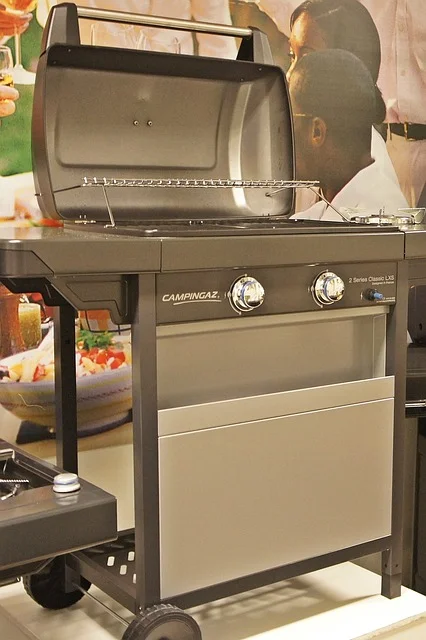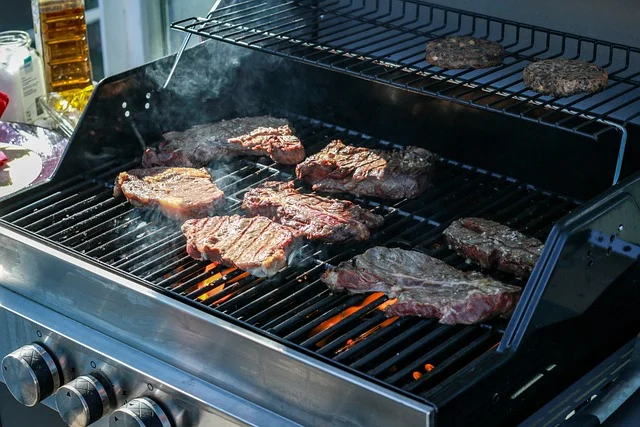Gas grills have been the centerpiece of many memorable barbecues, summer parties, and family gatherings. But as all things eventually do, grills wear out or become outdated. If you’re looking to replace yours, the question arises: “How do I dispose of this massive piece of equipment safely and responsibly?”
To dispose of a gas grill, detach and recycle the propane tank, clean the grill, dismantle it, and then recycle, donate, or use curbside pickup for the grill’s body, ensuring environmental and safety considerations are met.
Let’s dive deep into the methods, precautions, and alternatives for disposing of your gas grill.
How to Dispose of a Gas Grill

We get it; saying goodbye to your trusty grill can be a touch nostalgic.
But let’s ensure it’s done right, preserving the environment and ensuring safety.
Propane Tank Disposal
The propane tank is arguably the most crucial part of a gas grill, especially when considering disposal. This component can pose significant risks if not handled correctly.
- Safety Protocols: Before attempting any disposal methods, ensure that the propane tank valve is securely closed. It’s essential to never throw out a propane tank with regular trash, even if it’s empty. Residual gases can cause an explosion.
- Emptying the Tank: If you believe there’s still propane left, it’s best to use it up entirely by grilling. Alternatively, if you’re not going to use it, consider asking neighbors or friends if they need some extra propane.
- Recycling and Drop-off Locations: Many cities have designated drop-off locations or recycling centers that specifically accept propane tanks. Some retail locations that sell propane may also offer exchange programs or dispose of old tanks when you purchase a new one.
- Hazardous Waste Facilities: If recycling centers near you do not accept propane tanks, look for local hazardous waste facilities. They’re equipped to handle items that can pose potential environmental or health hazards.
Cleaning the Grill
Cleaning the grill not only preps it for safe disposal but can also be beneficial if you’re considering donating or repurposing it. A clean grill is more attractive and less of an environmental hazard.
- Grease and Ash: Years of grilling leaves behind ash and grease deposits. Remove ashtrays and scrape off accumulated ash. Use specialized grill brushes or steel wool pads to scrub away dried grease from grates and the inner body.
- Cleaning Solutions: Opt for environmentally friendly cleaning solutions. Many grill cleaners on the market cut through grease effectively. Alternatively, a mixture of baking soda and water can act as a potent cleaner.
- Rust Removal: Over time, outdoor exposure can cause rusting, especially in grills not covered or stored in a sheltered location. Steel wool or wire brushes can be used to scrub away rust spots. After scrubbing, rinse and wipe down all parts of the grill.
Dismantling the Grill
Dismantling might sound daunting, but with a systematic approach and the right tools, it’s a straightforward process.
- Safety First: Before beginning, ensure you’ve put on safety gloves to avoid cuts or scrapes. If your grill has any electrical components, make sure it’s unplugged.
- Tool Assembly: Gather essential tools like screwdrivers, wrenches, and pliers. Depending on your grill model, you might need specific types or sizes.
- Separation of Parts: Start by removing the grill grates, followed by burners, heat shields, and other internal components. Many grills have these parts attached with screws or clips which can be easily unfastened.
- Plastic and Non-Metal Components: After detaching metal parts, focus on plastic components like knobs, handles, or any decorative elements. Often, these parts are snapped into place or screwed on and can be removed with a gentle tug or unscrewing.
- Disposal and Recycling: Once you’ve dismantled your grill, you can more easily decide which parts can be recycled, trashed, or even sold as scrap metal. Separating the metals can be beneficial if you’re thinking of selling them to scrapyards.
Recycling
Recycling your gas grill not only declutters your space but also contributes positively to the environment, minimizing waste and promoting sustainable practices.
- Metal Scrap Yards: Before you head to the local scrapyard, it’s a good idea to call ahead and understand their requirements. Some yards prefer metals to be separated, while others might buy the entire structure. Depending on the weight and the metal components, you might get a fair price for the grill’s body.
- Municipal Recycling Programs: Many local municipalities encourage recycling by offering specific programs or designating days to collect large metal items. Research or call your local town or city’s waste management office to get information about their policies and procedures.
- Drop-off Centers: Certain recycling centers are specially equipped to handle bulky metal items like grills. However, they might charge a nominal fee for the service.
Repurposing Ideas
Before deciding to dispose of your old grill, consider the myriad of ways it can find a second life.
- Fire Pit: The large basin of a grill is perfect for converting into a backyard fire pit. Add some wood and voila, you’ve got yourself a cozy spot for those chilly evenings.
- Garden Planter: The depth of the grill base can make an excellent planter. Fill it with soil, and it can be an attractive spot for flowers, herbs, or even shallow-rooted vegetables.
- Outdoor Storage: Once cleaned, the grill can act as a storage unit for garden tools, wood logs, or even kids’ outdoor toys. The wheels make it easy to move around as needed.
- Artistic Endeavors: Got a creative streak? Why not turn parts of the grill into a unique art piece or garden sculpture?
Donating the Grill
If your grill is still functional but simply doesn’t cater to your needs, donating might be a wonderful option.
- Charities and Non-Profits: Organizations such as Goodwill or The Salvation Army often accept items like grills, especially if they’re in good working condition.
- Community Centers: Local community centers or recreation areas might appreciate a donated grill for hosting events or community barbecues.
- Online Platforms: Websites like Freecycle or even community groups on platforms like Facebook allow users to list items for donation. It’s a great way to pass on the grill to someone nearby who might need it.
Curbside Pickup
Sometimes, the simplest way to dispose of large items like a grill is through curbside pickup.
- Scheduling: Many waste management services offer scheduled pickups for bulky items. There might be specific days dedicated to such collections or you might need to set up an appointment.
- Preparation: Ensure the grill is free of propane tanks and has been cleaned. Depending on your locality’s guidelines, you might also need to dismantle it.
- Fees: Some municipalities may charge an additional fee for the pickup of bulky items, while others offer the service for free. It’s always a good idea to check beforehand.
Safety Considerations

When disposing of a gas grill, it’s paramount to prioritize safety. Grills, especially those that have been used extensively, contain residues, combustibles, and other hazardous elements.
- Gas Leaks: One of the foremost concerns with gas grills is the potential for residual gas. Even when you think the tank is empty, there might still be trace amounts left. Always ensure the valve is shut off and, if possible, detach the propane tank before starting the disposal process.
- Sharp Edges: As grills age, some parts might corrode, leading to sharp edges or fragments. Use gloves when handling old or rusted grill parts to prevent cuts or injuries.
- Chemical Residues: Grills might have accumulated grease, cleaning agents, or other chemicals over time. It’s essential to clean and neutralize these as much as possible to prevent harmful exposure.
- Transportation: If moving the grill for disposal, secure it properly in your vehicle. Ensure no parts can move or fall, posing a risk to others on the road.
Environmental Impact
Gas grills, like many other household items, have an environmental footprint that extends beyond their use.
- Waste: Dumping a grill in a landfill contributes to the growing waste management problem. Non-biodegradable parts can persist in the environment for decades.
- Chemical Pollution: The residues from charred food, cleaning agents, and even the grill’s manufacturing process can leach into the soil, causing contamination.
- Resource Waste: Grills are made up of metals and other resources that can be recycled or reused. Disposing of them without consideration means those resources are wasted.
- Carbon Footprint: Manufacturing a new grill has a carbon footprint. By recycling, repurposing, or donating your old grill, you might be reducing the demand for new products, thereby conserving energy and reducing carbon emissions.
Alternatives to Disposal
Before bidding adieu, consider if the grill can be refurbished. Sometimes, a simple replacement of parts can give it a new lease on life.
Or, consider some of the following:
- Sell or Trade-In: If your grill is still in decent condition, consider selling it or trading it in. Many stores offer trade-in options, giving you a discount on a new purchase in exchange for your old grill.
- Refurbishment: Some parts of the grill might be worn out, but replacing them could give the grill a new lease on life. Look into refurbishing options before deciding on disposal.
- Community Sharing: Some communities have shared spaces where residents can bring items for communal use. Your old grill could find a new home in a community garden or shared recreation space.
- Parts Harvesting: Even if the entire grill isn’t functional, some parts might still be in good shape. Harvest these for future use or offer them to others who might need replacements for their grills.
- Art Projects: Grills, with their unique shapes and components, can be a fantastic base for art projects. Consider transforming your old grill into a decorative piece for your garden or home.
Key Takeaways From How to Dispose of a Gas Grill

Disposing of a gas grill requires a bit more thought than simply tossing it to the curb.
With safety, environmental consciousness, and a bit of creativity, you can ensure your old grill is either given a new purpose or properly laid to rest.
Remember, the goal is to be responsible, eco-friendly, and safe.
I’m Thomas, the owner of SustainableWave. Passionately promoting a sustainable planet. With experience in various eco-roles, I’ll share green tips, sustainability hacks, and personal eco-journeys on my blog.






